SCARBOROUGH – When Howard Gray and his son Charlie harvest lobsters off Prouts Neck, Howard takes on the lighter work — stuffing the bait bags and sizing the lobsters — while Charlie operates the boat and hauls the traps.
Although they work close to shore, their 28-foot boat is exposed to ocean swells. Howard, 77, sometimes struggles to keep his balance. By the end of a shift, his hips are so tired he can’t stand without pain.
He’d rather be home relaxing in an easy chair, he says, but retiring now would put his 46-year-old son out of work.
That’s because Howard has a fishing license, and his son — who has been on a waiting list for one since 2006 — probably won’t be eligible until at least 2017. Charlie cannot legally fish unless his father is on the boat with him.
“If I don’t come out, he can’t come out. It’s quite simple,” Howard said as he slipped rubber bands over lobster claws Thursday. “It’s not right. A person should be able to come out and harvest. It’s a natural resource that belongs to everyone in the state of Maine.”
The issue of who gets access to Maine’s $300 million lobster fishery is the subject of a long-simmering dispute that is getting renewed attention from the Legislature and Gov. Paul LePage.
The central question is whether the rules governing lobster licenses should remain as they are — open to residents under age 18 at little cost, but effectively off-limits to almost everyone else — or whether anyone should be allowed to fish as long as he can afford to buy a license from another fisherman who has one.
Opening lobster licenses to the free market would give retiring fishermen a nest egg while opening up the industry to more people, say the supporters of free-market reforms. To keep corporations from buying up licenses, the state could stipulate that only residents who own and operate their own boats would be eligible.
Opponents say a free-market approach would make lobstering unaffordable for young people from traditional fishing communities. They say it’s unfair to give one generation a windfall and burden another with debt.
The issue gained attention in March at the Maine Fishermen’s Forum in Rockland when Norm Olsen, then commissioner of the Department of Marine Resources, said lobster fishermen have been given a property right that is denied to other Maine residents.
“The average citizen of the state of Maine isn’t allowed to go out and catch lobsters and make a living from them. Only the lobstermen are,” Olsen told the gathering.
Olsen resigned last month, but LePage wants to examine whether the state should change the system, according to acting Commissioner Patrick Keliher.
“We need to take a fresh look at the system and see where the limited-access entry system has its failures,” Keliher says.
With the support of the administration, the Legislature in May passed L.D. 1532, instructing the Department of Marine Resources to hire a consultant to conduct an independent cost-benefit analysis of the current system and compare it with how licensing is handled elsewhere. The study must be reported back to the Legislature by January 2013.
His role as commissioner, Keliher says, is to facilitate a conversation about the issue with the industry. In the end, no changes can be made without the approval of the Legislature, and it’s unlikely that the Legislature will do anything without the consent of the politically powerful lobster industry.
WAITING LISTS ARE LONG
While the current, 15-year-old system is designed to make it easy and inexpensive for teenagers to enter the fishery, increasingly tighter rules over the years have made it almost impossibly difficult for adults.
As the law works now, young fishermen can automatically qualify for a fishing license by completing a two-year apprenticeship before reaching their 18th birthday. An apprentice license costs $65 for someone under age 18 and $132 for anyone 18 and older. The program requires apprentices to pass a boating safety course and fish with a licensed fisherman for at least 1,000 hours and 200 days.
Applicants age 18 and older must also complete an apprenticeship. They then must wait for a certain number of trap permits, or tags, to be retired, and a certain number of fishermen to give up their licenses — the number of each varies by fishing zone, but the wait lasts for years in almost every zone.
Charlie Gray’s situation illustrates how the current system keeps adults out of the fishery.
A fifth-generation lobsterman, he fished from age 12 until he was in his early 30s, when he gave up his license during a time when the fishing wasn’t particularly lucrative so he could take a job driving a truck.
He returned to fishing in 2003 and began the process of getting his license back. That meant becoming an apprentice for two years under his father, who sponsored him. As an apprentice, Charlie must have his father on the boat with him at all times.
They fish in Zone G — waters between the New Hampshire border and Cape Elizabeth.
In 2004, with just two months left in his apprenticeship, he says, the fishermen in Zone G changed the rules to require that five fishermen leave the fishery for every one who enters. The previous rule was that two fishermen had to leave for every one who entered. Fishermen in each zone decide many of the rules that determine who can get a license there.
Subsequently, the rules were changed again to require that 4,000 trap tags be retired before a fisherman on the waiting list could get a license.
The rules, which are similar in the other zones, are designed to limit the overall number of traps and fishermen while keeping the fishery open for young people.
There are 52 people on the waiting list in Zone G. All have completed their two-year apprenticeships.
In 2010, two fishermen on the list received licenses, and in 2011 another received a license. Charlie Gray, who is now No. 5 on the list, figures he’ll get a license in 2017 or 2018.
He says fishermen who already have licenses have set the rules to keep the fishery to themselves.
“They’ve got the place cinched up,” he says. “They don’t want to allow people in.”
Jodie Jordan, a Cape Elizabeth fisherman who sits on the Zone G Lobster Zone Council, says he is sympathetic to Gray’s plight, but there is nothing the council can do about it.
“You let one in, you’ve got to start letting everybody else in,” he said.
The same issue occurs in five of six other zones. At the current rate, people placed on a waiting list this year in those zones will have to wait eight to 26 years to receive a license. The only exception is Zone C, in the Penobscot Bay area, where lobstermen have opposed limits on the number of fishermen.
THE CASE FOR YOUTH ACCESS
The industry appears to be divided over the issue. In eastern Maine, where obtaining a commercial lobster license is one of the few avenues to earning a middle-class income, many lobstermen defend the current rules because they ensure that their children and other young people in their towns can get a license at minimal cost.
Allowing fishermen to sell their licenses would provide current fishermen with an unearned cash windfall — they didn’t have to buy their licenses on the open market — but make it much more difficult for children from families of modest means to get into the fishery, said John Drouin of the Washington County town of Cutler, who is chairman of the Zone A Lobster Zone Council.
Drouin has a stepson and a son, ages 14 and 15, who already have commercial fishing licenses and operate their own 20-foot boat.
Based on the market value of licenses to trap lobsters in Nova Scotia and in U.S. federal waters — different rules apply to obtaining licenses to lobster in offshore federal areas — the price of a license in Maine would cost $50,000 to $100,000, he says.
“Where would they come up with that kind of money to buy a piece of paper for the right to go fishing?” he asks.
Allowing lobstermen to sell their licenses would result in many fishermen becoming “sharecroppers” for whoever provided the capital to buy the permits, said Robin Alden of Stonington, who was commissioner of the Department of Marine Resources when the apprentice program was instituted in 1996.
She says the apprentice system was designed to fit the traditional fishing culture in Maine, where expertise is passed down through families, and those who own the lobster boats are the ones doing the fishing.
Still, she acknowledged, the growing waiting lists are a problem. She says she hopes that the state conducts a “holistic” study of the system that considers other solutions besides allowing fishermen to sell licenses.
Patrice McCarron, executive director of the Maine Lobstermen’s Association, says she doesn’t know of a single lobsterman who wants to make money by selling a lobster license if doing so would make it harder for young people in his or her community to join the fishery.
“People want a way for kids to get into it,” she says. “You don’t have to be rich to get into the lobster industry. You have to work hard and build your way in.”
THE CASE FOR SELLING TRAP TAGS
In southern Maine, where the fishery is less profitable and there are other economic opportunities for young people, more lobstermen support allowing licenses to be transferred.
In the May newsletter of the Maine Lobstermen’s Association, Long Island lobsterman Steve Train proposed that fishing licenses be made available to anybody who graduates from the apprenticeship program. The only catch is they would have to buy trap tags — permits for individual lobster traps — from a licensed fishermen.
“I think that concept is more fair to everybody,” he says. “It treats everybody the same — regardless of age.”
Lobstermen would be allowed to buy and sell the tags, but the state could set limits on the overall number of tags being used. Current rules limit Maine lobstermen to 800 trap tags.
Train says his proposal would use the free market to open up the fishery while at the same time protecting the resource, because regulators could more easily regulate the number of traps in the water.
Because lobstermen in the current system pay only a nominal fee for trap tags, many lobstermen buy more tags than they need. They hold on to them so they have a cushion in case the state imposes more restrictions on the number of traps people can use, for example, requiring each lobster fisherman to reduce the number of tags they are using by a certain percentage. Likewise, fishermen keep their lobster licenses even if they have stopped fishing so they can maintain their fishing rights.
There were nearly 6,000 licensed Maine lobstermen last year, but only 4,300 did any fishing. There were 3 million trap tags, but only 2.6 million traps were in use, according to the Department of Marine Resources.
Past efforts by regulators to restrict fishing by reducing the number of traps mainly resulted in eliminating traps that already were not in use. If fishermen had to pay free-market prices to buy trap tags, they wouldn’t buy extra ones, Train says. As a result, regulators, using tag limits, would be more easily able to control the size of the lobster harvest, he says.
Over the past several years, Charlie and Howard Gray have unsuccessfully lobbied the Legislature to change the rules to allow a parent to transfer a license to a son or daughter. They now support Train’s idea because it would produce the same result by allowing Charlie to go fishing on his own.
As it stands now, though, if his father gets sick or dies, Charlie would be out of a job, he says.
Unless the rules are changed, he says, his only hope is for his father to stay healthy enough to keep working on the boat or for LePage to grant him an exemption.
“You have to ask the Almighty — or the governor — how long I have to go,” he says.
MaineToday Media State House Writer Tom Bell can be contacted at 791-6369 or at:
tbell@pressherald.com
Copy the Story Link
Send questions/comments to the editors.

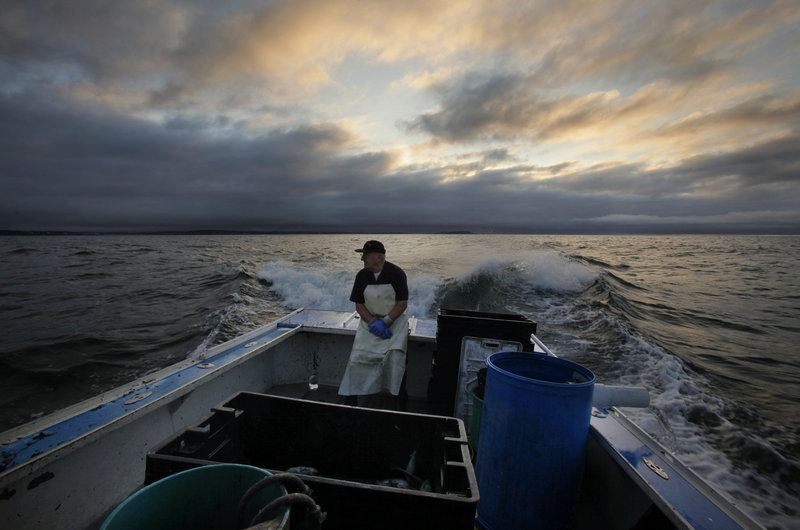
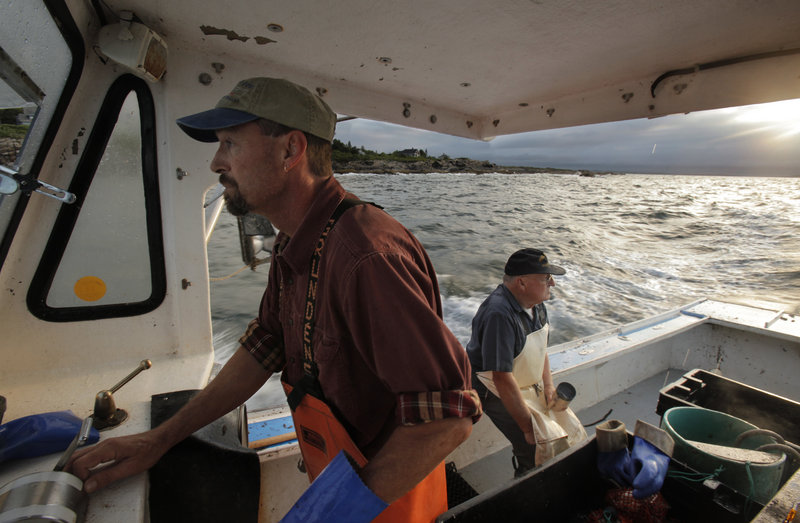
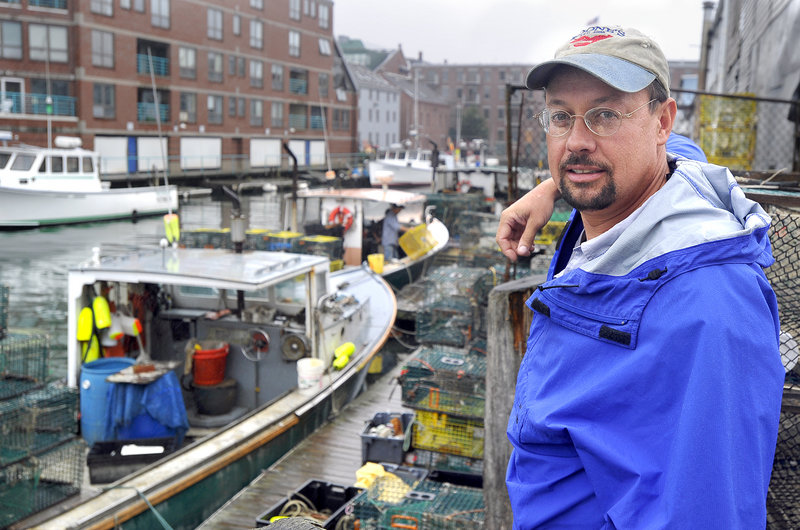
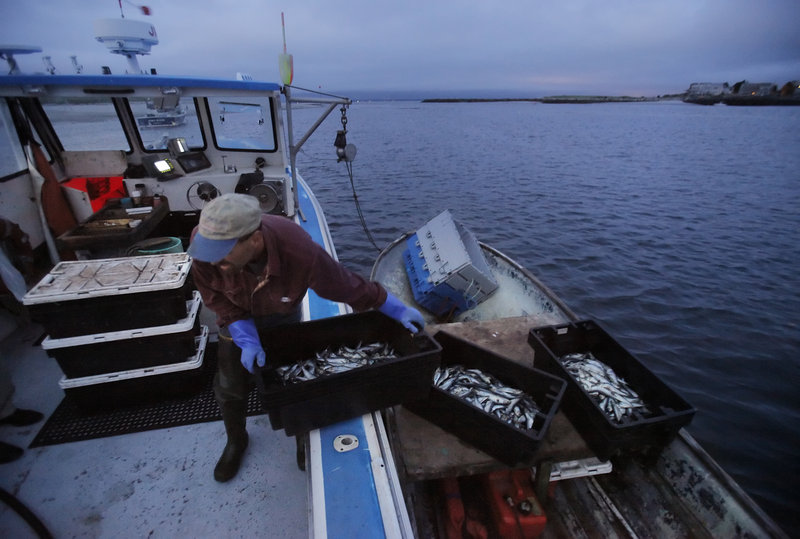
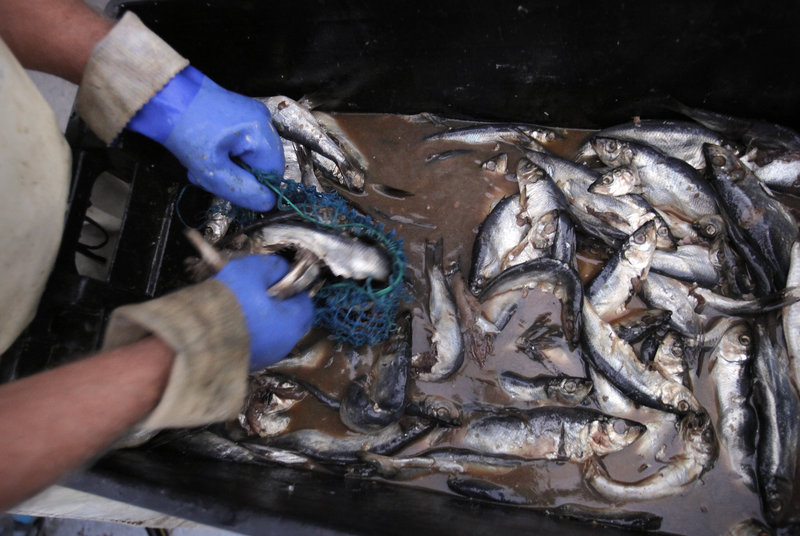

Success. Please wait for the page to reload. If the page does not reload within 5 seconds, please refresh the page.
Enter your email and password to access comments.
Hi, to comment on stories you must . This profile is in addition to your subscription and website login.
Already have a commenting profile? .
Invalid username/password.
Please check your email to confirm and complete your registration.
Only subscribers are eligible to post comments. Please subscribe or login first for digital access. Here’s why.
Use the form below to reset your password. When you've submitted your account email, we will send an email with a reset code.